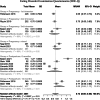Pregorexia: a systematic review and meta-analysis on the constructs of body image dissatisfaction and eating disturbances by gestational age in the peripartum
- PMID: 37526698
- PMCID: PMC10393903
- DOI: 10.1007/s40519-023-01595-8
Pregorexia: a systematic review and meta-analysis on the constructs of body image dissatisfaction and eating disturbances by gestational age in the peripartum
Abstract
Purpose: Pregorexia is a phenomenon posited to occur in the peripartum, characterized by an attempt to counter pregnancy's physiological changes in body shape through reduced calorie intake or increased physical activity.
Methods: In this pre-registered systematic review and meta-analysis, body image dissatisfaction and eating psychopathology in the peripartum according to gestational age were formally assessed. PubMed was searched up to May 2023. Selection criteria were represented by studies on body image concerns or eating psychopathology in the peripartum (up to 1 year after delivery). The population needed to include women from the general population or among patients with a history of (or current) eating disorder. For the meta-analysis, 17 studies were included: 10 for body image dissatisfaction (2625 individuals overall), 7 for eating behaviors (2551 individuals overall). The interplay between body image and the following themes was examined in depth: the adoption of breastfeeding, peripartum depression, sociocultural influences on body image, sexual disturbances, experiencing or reporting an altered food intake.
Results: Progressive dissatisfaction with body image during pregnancy by gestational age was observed, stably elevated for at least 12 months postpartum. Eating psychopathology was observed as elevated only at 12 months in the postpartum, but not during pregnancy.
Discussion: The current work offers normative values of body image satisfaction and eating psychopathology in the peripartum by gestational age. The relevance of current results was discussed, in order to inform both current clinical practice and future public policies.
Level of evidence: Level I-Evidence obtained from: systematic reviews and meta-analyses.
Keywords: Body image; Eating psychopathology; Feeding and eating disorders; Postpartum; Pregnancy.
© 2023. The Author(s).
Conflict of interest statement
The authors declare that they have no conflict of interest.
Figures



Similar articles
-
Gestational weight gain below instead of within the guidelines per class of maternal obesity: a systematic review and meta-analysis of obstetrical and neonatal outcomes.Am J Obstet Gynecol MFM. 2022 Sep;4(5):100682. doi: 10.1016/j.ajogmf.2022.100682. Epub 2022 Jun 18. Am J Obstet Gynecol MFM. 2022. PMID: 35728780
-
Maternal and neonatal outcomes of elective induction of labor.Evid Rep Technol Assess (Full Rep). 2009 Mar;(176):1-257. Evid Rep Technol Assess (Full Rep). 2009. PMID: 19408970 Free PMC article.
-
Drugs for preventing postoperative nausea and vomiting in adults after general anaesthesia: a network meta-analysis.Cochrane Database Syst Rev. 2020 Oct 19;10(10):CD012859. doi: 10.1002/14651858.CD012859.pub2. Cochrane Database Syst Rev. 2020. PMID: 33075160 Free PMC article.
-
Planned early delivery versus expectant management for hypertensive disorders from 34 weeks gestation to term.Cochrane Database Syst Rev. 2017 Jan 15;1(1):CD009273. doi: 10.1002/14651858.CD009273.pub2. Cochrane Database Syst Rev. 2017. PMID: 28106904 Free PMC article.
-
Systemic pharmacological treatments for chronic plaque psoriasis: a network meta-analysis.Cochrane Database Syst Rev. 2021 Apr 19;4(4):CD011535. doi: 10.1002/14651858.CD011535.pub4. Cochrane Database Syst Rev. 2021. Update in: Cochrane Database Syst Rev. 2022 May 23;5:CD011535. doi: 10.1002/14651858.CD011535.pub5. PMID: 33871055 Free PMC article. Updated.
Cited by
-
Exploring the Relationship Between Eating Disorders and Reproductive Health, with a Focus on Fertility, Obstetric, and Fetal Outcomes: A Narrative Review.Curr Nutr Rep. 2025 Mar 25;14(1):51. doi: 10.1007/s13668-025-00641-4. Curr Nutr Rep. 2025. PMID: 40131607 Review.
-
Child eating disorder examination (ChEDE) interview and child eating disorder examination questionnaire (ChEDE-Q): psychometric properties of the Italian versions.Eat Weight Disord. 2025 Mar 17;30(1):26. doi: 10.1007/s40519-025-01737-0. Eat Weight Disord. 2025. PMID: 40097864 Free PMC article.
-
Pregorexia: a psychotherapy strategy for eating disorders in pregnant women.Consort Psychiatr. 2023 Jul 10;4(2):111-114. doi: 10.17816/CP6642. Consort Psychiatr. 2023. PMID: 38250645 Free PMC article.
References
-
- Mandera A, Pawlikowska A, Szuster EM, Całkosiński A, Kostrzewska P, Majewski M. The pregorexia - anorexia during the pregnancy. J Educ Health Sport. 2019;9:137–144.
-
- Asselmann E, Kunas SL, Wittchen H-U, Martini J. Changes in psychopathological symptoms during pregnancy and after delivery: a prospective-longitudinal study in women with and without anxiety and depressive disorders prior to pregnancy. J Affect Disord. 2020;263:480–490. doi: 10.1016/j.jad.2019.11.112. - DOI - PubMed
Publication types
MeSH terms
LinkOut - more resources
Full Text Sources
Medical
Research Materials

